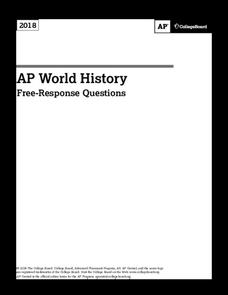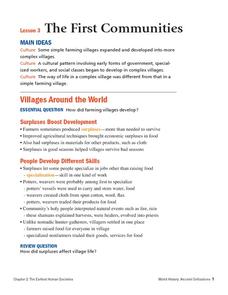National Wildlife Federation
Quantifying Land Changes Over Time in Areas of Deforestation and Urbanization
Is qualitative or quantitative research more convincing when it comes to climate change? In the eighth lesson during this 21-part series, scholars begin by performing a quantitative analysis of deforestation and urbanization. Then, they...
New York State Education Department
Global History and Geography Examination: January 2010
Agriculture was more revolutionary than some might think. Using a primary source set—including photos of artifacts from Mesopotamia and an amusing comic—learners consider the impacts of the neolithic, agricultural, and green revolutions....
College Board
2018 AP® World History Free-Response Questions
How were the development of railroads critical to the rise of empires? Scholars delve into the relationship between the two using a documents-based question from College Board. Other prompts explore ideas such as nomadic and sedentary...
Council for Economic Education
The Economic System of Medieval Europe
How are economics and politics intertwined? Societies in the Medieval period used feudalism for both economic and military reasons. The arrangement provided safety and met other needs. Using the included simulation, individuals...
Council for Economic Education
The Neolithic Agricultural Revolution
What effect could one person's invention have on the human race? In the case of the Neolithic Agricultural Revolution, small improvements in farming methods led to increased food production. The human population began to boom, leading us...
Council for Economic Education
Great Civilizations Develop around Rivers
If you lived in prehistoric times, what kinds of choices could your family make to increase their chance of survival? By making similar decisions in a simulation game, participants discover how specialization creates both opportunity and...
Earth Day Network
The Neolithic Revolution
With the abundance of food products we can easily access in our society today, it is easy to forget the toll this can take on our global environment. Young learners will discover how the transition to agriculture and domesticated living...
Curated OER
Prehistoric Culture
Make prehistoric culture easy for your class to understand with this well-composed presentation. It provides timelines for the Neolithic, paleolithic age, and the agricultural revolution. Images and information on two prehistoric sites...
Houghton Mifflin Harcourt
The First Communities
These documents list essential questions and foundational concepts associated with early civilizations and farming communities in the agricultural revolution. Use this as a starting point for developing specific lessons and activities...
Beacon Learning Center
Growth of a Revolution-The Industrial Revolution
How did changes of the agricultural revolution in eighteenth century Great Britain influence the Industrial Revolution that followed? How were inventions and processes of the Industrial Revolution interrelated? This resource includes a...
Curated OER
INDUSTRIAL REVOLUTION
Tenth graders identify causes and effects of the Industrial Revolution, analyze the benefits and negative consequences, describe the operation of British government, and identify British social and political reforms resulting from the...
Curated OER
Industrial Revolution - History before the Industrial Revolution
Sixth graders consider how inventions fueled change. In this Industrial Revolution lesson, 6th graders view a PowerPoint presentation that feature technological innovations that made it possible to create goods in factories. Students...













